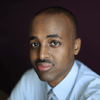 Mohamed Ali, J.D., is a 2013 New Voices Fellow and the founder of the Iftiin Foundation, an organization that incubates social ventures and encourages innovation among young leaders in Somalia.
Mohamed Ali, J.D., is a 2013 New Voices Fellow and the founder of the Iftiin Foundation, an organization that incubates social ventures and encourages innovation among young leaders in Somalia.
Somalia has often been called the land of bards. Poetry is the preferred medium for storytellers—as it is for many countries across Africa.
These stories are often family affairs: a poetry slam, but impromptu and unrehearsed, done over tea in the living room together with your parents and grandparents—everyone applauding each clever turn of phrase and startling rhyme.
One night recently, my family gathered for such an evening, and the star of the night was my grandmother, whose tiny figure belied a power of voice that left us in rapt silence.
With the hypnotic cadences of a seasoned Somali poet, she told us the story of a love-struck daughter of a rich Somali merchant whose life was engulfed by civil war. It was tragic, it was hilarious, it was touching and it was utterly Somali. But most of all, it was a complete story.
When the story of Africa is told by others, it never seems to be as complex or nuanced as the story told by my grandmother that night. While she wove threads of triumph, heartbreak and tragedy into a full narrative, the stories others tell of us are often one-dimensional at best.
Shortly afterwards, I took part in a conference on African economic development.
The story being told that day was of a rising Africa: once a dark continent filled with poverty, war, and disease, Africa—we were told—was now home to a flourishing and tech-savvy middle class riding a wave of economic growth and foreign investment into a new era of democracy and wealth.
Its one-dimensional simplicity stood in stark contrast to the complex story told by my grandmother in our crowded living room.
Both the “Hopeless Continent” and “Africa Rising” storylines are single narratives, often told by non-Africans, that glide over the paradoxes and complexities of Africa today.
High growth rates are being achieved, but social welfare often lags, particularly for rural populations. Africa’s complete story should not only be one of opportunity, but also one of the need for equitable distribution, sustainable livelihoods, good governance and the fight against inequality amidst growth.
How the story of Africa is told is important, especially when one-sided narratives inform policy-making. The New Voices Fellowship gives me and other African storytellers the opportunity to weave our experiences into the broader narrative of development, challenge and opportunity that will be Africa’s story for decades to come.

